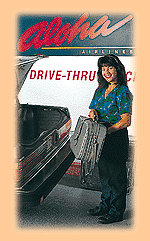 |
There are No Easy Solutions |
||||
|
Even the Best US Carriers Find the Present Situation Difficult It is easy and common for me and other observers to come up with lots of theoretical solutions to the current nightmare that confronts us as travelers. But here is a rare opportunity for a senior and sensible airline executive to interactively explain the real world constraints that make it difficult for any airline to instantly react to the new operational challenges they must confront. Bottom line - there are no easy solutions. And, alas, no quick solutions, either.
Aloha has always been an innovator, and was the first airline to introduce 'drive through' check-in. Alas, this, along with their Porter assisted Curb-side check-in, Express check-in and Gate check-in has all had to be abandoned (same as with the other airlines) due to the new security procedures imposed by the FAA.
[serverinclude/googleads/GA-160600-rhs-belowtop.htm]
|
I asked Jim King, Senior Vice President of Planning and Business Development at Aloha Airlines, and a 20+ year industry veteran, why it is that the major airlines can't do a better job of improving our customer travel experience. In case you haven't heard of Aloha (and many people that don't live on the west coast or travel to Hawaiian islands other than Oahu haven't), this is how my colleague Joe Brancatelli describes them : Aloha is a terrific little airline, the choice of business travelers in the Hawaii inter-island market. And they have a lovely mainland service to the West Coast. They're a little Southwest (one fleet type, including the mainland flights), a little old-style Eastern Shuttle (lots of regular flights), and a little Virgin (a nice first-class, plenty of perks). If every US carrier operated like Aloha does, then business travelers would be VERY happy. I was keen to bounce some ideas off such an excellent airline in terms of how the major carriers could respond and do a better job of customer service post 11 Sept. Here's a record of our email discussion. My comments are in blue, and Jim's in brown. Last week I spoke about the unfortunate traveler who had to wait 50 minutes to fly a 20 minute inter-island flight in Hawaii. If the airlines are going to passively respond to the new security measures by effectively doing nothing and destroying the customer experience, they're going to lose their customers. Meanwhile, as I wrote the week before, they're keeping ridiculously high prices that are discouraging the people that might fly from actually getting back in the air. You guys are collectively crazy! It's not that simple, David. When people are afraid to get on an airplane, the only thing that lower pricing accomplishes is to dilute the revenue you would have gotten from the people who aren't afraid. Those 'pointy-head MBAs' (your term) in the pricing departments across airline land have to strike a very delicate balance between generating additional revenue with low prices and losing all of it and more because of diluted yields. It's kind of like "buy low and sell high"; if it was so easy a lot more people would be doing it! You're quite right, Jim - I know some people that you couldn't pay to get on a plane at present! But let's look at the people that might be willing to travel. To get these people back in the air, you need to tempt them with a 'deal' and also remove the massively negative experience that surrounds any type of air travel at present. Who wants to spend three or four hours just to check in? Why don't you just lock the doors of the airline terminals and give up entirely! Yes, let's address the unpleasantness of air travel, especially with the new security precautions. The first point here is that the FAA is calling the security shots, not the airlines. Nearly every day there are new directives coming down from them, sometimes vague and sometimes not even easily feasible, but at present, what airline is going to argue over the interpretation or feasibility? We all just have to urgently implement everything, and then try and make operational sense of it subsequently. Unsurprisingly, different airlines (and even the same airline at different airports) are implementing these directives in different ways according to how they are first interpreted and what is possible with the existing resources. Eventually that sorts itself out, but when new directives are coming in one after the other, it gets messy. Are the carriers worried about this? You bet! Do airlines like arguing with their customers and annoying them with check after check? Of course not, but when the whole world changes, it does take a little time to smooth things out. I don't think you can fairly blame the FAA for everything, Jim. This is, after all, the same FAA that many commentators regularly criticize for being too much on the airlines' side when it comes to implementing many safety issues! But, putting that to one side, let's cut to the solution, not the problem - how about my suggestion that the airlines simply hire more staff to help speed up their customer processing? I'm not blaming the FAA. This is an unprecedented problem with no quick and easy solutions. Throwing more people at it sounds easy, but the hiring and training can take months. Just the FAA-required security clearances can take that long. And when many airlines are already hemorrhaging cash due to the severe drop in traffic, this might be a bet-the-company investment. At the end of the day though, one of your conclusions is probably correct. A lot of people are going to cut back on travel because the new security regime is going to make short trips not worth the hassle. And that is my point, exactly! As for security checks, hiring and training, heck - most airlines are letting so many staff go (and I bet some of those are customer service staff, too) - why don't they just retrain existing staff? And, this whole problem with service - the industry is going about it backwards, and making things worse for us and you. This is what I would do - what do you think : I'd buy $75 timeclocks and put them at the head of each check-in line at each airport I operated from. I'd then ask passengers to 'punch' their ticket when they first arrived at the end of the line. Then I'd put in place a service guarantee, promising 'if we can't check you in within 15 minutes of you arriving in line, we'll give you a bonus 1,000 miles for every extra five minutes or any part thereof that you have to wait in line'. Let's think about this idea. The cost to implement it and the lead time to do so? You said earlier that adding extra customer service staff might be a 'bet-the-company' investment. I won't hold you to those words; but if you wish to stand by them, I'd encourage mainland airlines (Aloha is in a different situation entirely - I suspect you have very little discretionary travel) to do exactly that and indeed bet their company on it. Heck, based on Goodwin's comments, it is a no-lose proposition - United is going to go broke anyway, so why not rather than just make a public spectacle of predicting its demise, actually do something positive to prevent it! The cost would be truly minimal and, as I pointed out in my column, it only takes a very very small number of extra passengers to more than recoup these costs. The public relations impact would be enormous. Furthermore, the cost of giving away a thousand miles here and there is almost too small to measure, and the pleasure people would get upon receiving the miles would mean that, for many people, being kept waiting more than fifteen minutes would be a bonus rather than a penalty! Well, you're right about one thing, David. The airlines will eventually fix this because they have to. The alternative is to watch traffic drop even more because traveling is just too hard. Aloha has, in fact, brought some people off furlough to do security processing, although not everyone accepted because it is not very pleasant work. But it is going to take time and a lot more than some extra people for the passenger processing to flow smoothly again. It may be seven weeks past the Trade Center tragedy, but the issues that airlines have had to deal with in that period have been in a constant state of flux. So, pretty hard to make a customer service recovery plan when the rules change every day or two. I really wish we could guarantee to check people in within 15 minutes - yes, it sure would be a great sales tool; but there is a lot more to it than just throwing manpower at the problem. During peak times we already have all our check-in positions manned and making more is not trivial. We have to secure counter space from the airport (if there is any), wire the positions, install a bag belt, and so on. With equipment lead times, worst case scenario can make it a 6 to 12 month project. We used to be able to overflow people without checked bags to the gate and we had curbside check-in as well as drive-through check-in in the parking structure (that was an Aloha first). No more. Now it all comes to the counter. And more bags get checked now because of the reduced amount of carryon allowed, so the check-in is even more time consuming. As an aside, Aloha implemented a program called the Aloha Guarantee a couple years ago. The deal is that if you are dissatisfied with any aspect of our service, write us a letter about it and we will give you a free inter-island ticket. The nay-sayers said we were going to be giving away the airline to the scammers, but a funny thing happened. In our worst month of delays and problems we gave away free tickets to three-tenths of a percent of our passengers. Nevertheless, we have now decided to suspend the program until we can figure out a way to deal with the check in and security problems. But my point is that not all carriers view customers as cattle to be herded on and off airplanes. I'll close with a one line question, Jim : Accepting all the problems and the constraints that exist, the fact remains that you and your colleagues at the other airlines are paid the 'big bucks' to respond to and positively resolve these issues. What can the airlines do to most expeditiously restore some semblance of an efficient check-in experience, and why hasn't this been done already? There are no easy or fast answers. I/we all wish there were, just as much as you and all our other customers do, too. A full solution that mixes optimal customer convenience with higher levels of security will not only require more manpower, more training, and more equipment, but probably also a few breakthrough ideas such as official background checks for frequent flyers, a tamper-proof ID or retinal scanning. Realistically, we've got another month or more before most airlines settle into stable new systems and procedures and can start to optimize the current check in experience for their customers. And it will probably never be as fast and easy as it was before September 11; but don't you agree, David - a small investment in extra time and care on all our parts sure beats the alternative! Tell David your opinion. Send him an Email - [email protected]
Originally
written 2 Nov 2001, last update
21 Jul 2020 |
||||
